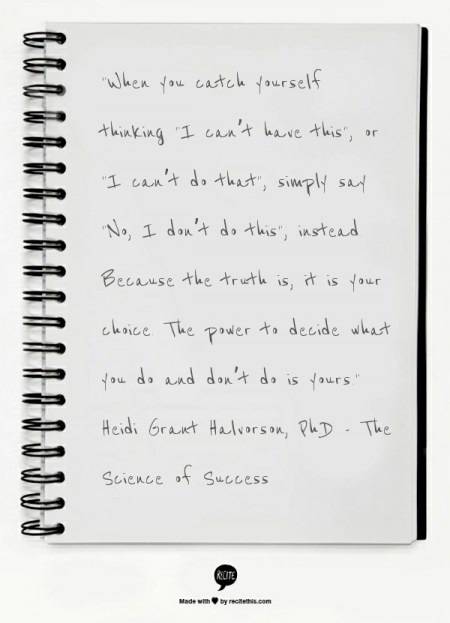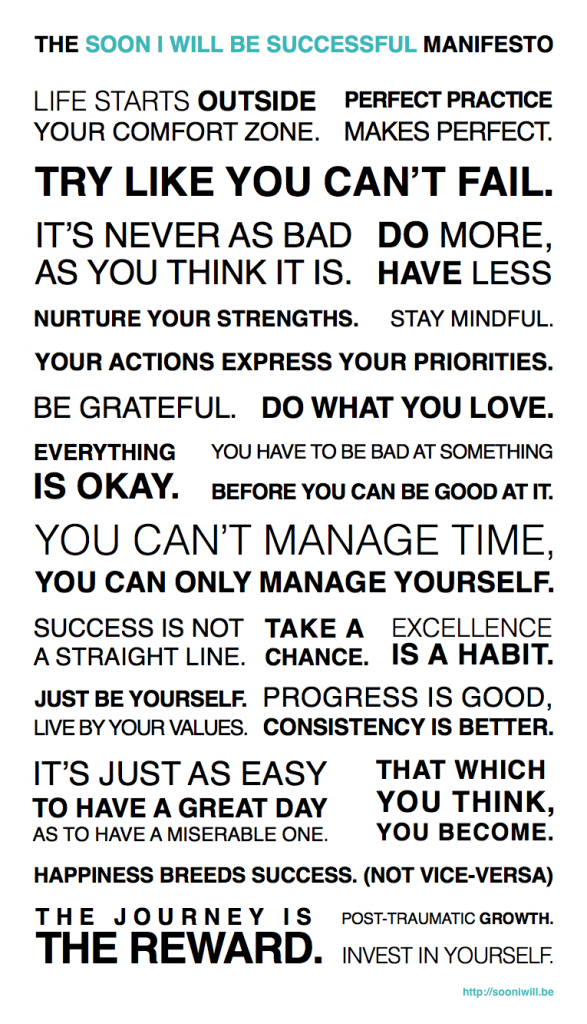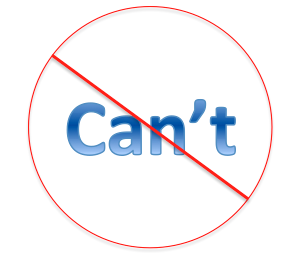I read an awesome post from Soon I will be Successful (a great blog with articles on Psychology, Success and Happiness by Vince Favila – see his awesome manifesto at the bottom of this post and check out the site!) and I cannot stop thinking about it. The article and links are about the power of word choice in determining outcomes. The word choice is simple: “I don’t” versus “I can’t”. The article (copied in full below – with bold “highlights” by me) discusses this. It really resonated with me. When I decided to give up diet soda (and my friends know how much I LOVE diet soda), I started saying “I don’t drink diet soda.” It worked. I haven’t had one since last April. However, when I put restrictions on myself like, “I can’t eat [enter any of a million sugary things I tell myself not to eat every day because they make me feel like crap]”, I inevitably do eat it (and usually more than I was originally targeting not eating). I need to work on “I don’t eat everything on my plate if I am full” and “I don’t eat whatever I feel like, and as much as I want because I ran 10 miles!”
Read this article and let me know what you think. And, heck, try it – it can’t hurt! (Pun intended).
 The Amazing Power of I Don’t (Rather Than I Can’t): What do you say to yourself when you’re faced with temptation? (from Psychology Today)
The Amazing Power of I Don’t (Rather Than I Can’t): What do you say to yourself when you’re faced with temptation? (from Psychology Today)
Published on January 18, 2013 by Heidi Grant Halvorson, PhD. in The Science of Success
To reach many, if not most of the goals we’d like to achieve – losing weight, getting ahead at work, improving a relationship –it’s not just a matter of taking action. There are things we need to stop doing if we want to be successful. We need to stop overeating, stop procrastinating, stop getting worked up over things that really don’t matter.
It’s hard to motivate yourself to adopt new habits, but it’s even harder to rid yourself of old ones. More often than not, it’s the latter that keep us from becoming the person we really want to be.
We need help – we need strategies that actually work. I don’t care how much self-control you have – willpower alone is not going to do the trick.
Thankfully, there are strategies that work. Here is a particularly useful one that was recently discovered by researchers at Boston College and the University of Houston.
Imagine you are on a diet http://www.psychologytoday.com/basics/diet, and you are enjoying a meal at a nice restaurant. After clearing the plates, your server says, “You know, we have an incredible chocolate cake on our dessert menu. We’re famous for it. Would you care to try it?”
Would you think to yourself:
“I can’t eat chocolate cake.” Or
“I don’t eat chocolate cake.”
If you think there is no real difference, you couldn’t be more wrong. Don’t and can’t may seem somewhat interchangeable, but they are very different psychologically. And if there is one thing that social psychologists have learned over the years, it’s that even seemingly subtle differences in language can have very powerful affects on our thoughts, feelings and behavior.
I don’t is experienced as a choice, so it feels empowering. It’s an affirmation of your determination and willpower. I can’t isn’t a choice – it’s a restriction; it’s being imposed upon you. So thinking “I can’t” undermines your sense of power and personal agency.
The difference between thinking “I don’t” and “I can’t” can be quite dramatic. In one study, students with a healthy eating goal were instructed that when faced with a temptation, they should say to themselves either “I don’t do X” or “I can’t do X”. (e.g., I don’t eat candy versus I can’t eat candy.) On their way out of the lab, they were told that they could choose a token of appreciation for their participation in the study: a chocolate bar or a granola bar. Who chose the healthier option? Sixty-four percent of those who said I don’t, compared to only thirty-nine percent of those who said I can’t.
In another study, twenty adult women who were working toward a health and fitness goal were encouraged to use either I don’t or I can’t language when they were tempted to lapse (e.g., skip the gym, grab a donut, etc.) On each of the next ten days, these women checked in via email to report on whether or not the strategy was working for them – if not, they were told they could stop using the strategy. By the study’s end, 8 out of the 10 women using the I don’t strategy were still using it successfully, while only 1 of the 10 who used I can’t lasted that long.
The beautiful thing about using this strategy is that it could not be easier – every time you catch yourself thinking I can’t have this, or I can’t do that, simply say No, I don’t do this, instead. Because the truth is, it is your choice. The power to decide what you do and don’t do really is yours. When you are always thinking I can’t, it’s easy to lose sight of that fact.
It’s time to take your power back, and now you know where to start.
For more science-based strategies you can use to reach your goals and get happier and healthier, check out her books Succeed: How We Can Reach Our Goals and Nine Things Successful People Do Differently. Also, check out Soon I will be Successful!
Here is the Soon I Will Be Successful Manifesto (Love it!)



